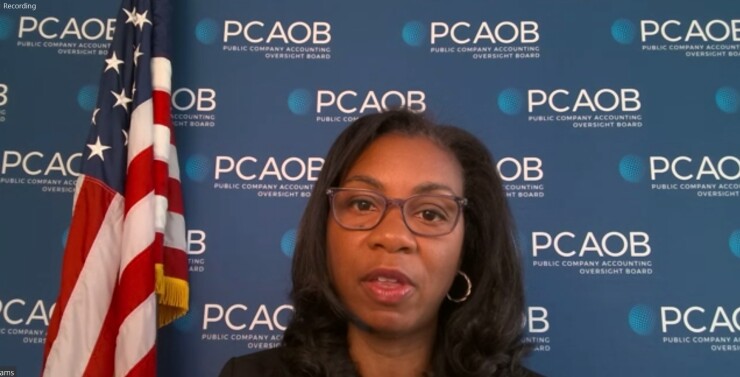The Public Company Accounting Oversight Board reported Tuesday that its inspectors are finding an "unacceptable" level of problems at auditing firms, with year-over-year increases once again during its 2022 inspections.
The inspections staff predicts approximately 40% of the audits reviewed will have one or more deficiencies that will be included in Part I.A of the individual audit firm's inspection report for 2022, up from 34% in 2021 and 29% in 2020, according to the
Part I.A describes deficiencies that are so significant that the staff believes the audit firm didn't get enough audit evidence to support its opinion on a company's financial statements or internal controls. In Part I.B, the staff describes instances of noncompliance with board standards or rules. Some audits have both Part I.A and Part I.B deficiencies, and the inspection staff expects approximately 61% of the 710 audits the PCAOB reviewed in 2022 will have one or more Part I.A and/or Part I.B deficiencies, up from 55% in 2021 and 44% percent in 2020.
The report is based on inspections of public company audits done by 157 audit firms in 2022.
"Part I.A findings are serious," said PCAOB chair Erica Williams during a press conference Tuesday. "They mean the audit firm failed to obtain sufficient appropriate evidence to support its opinion, and audit opinions were signed without completing the audit work required to verify the financial statements. These deficiencies are up for nearly every category of the 157 audit firms the PCAOB inspected in 2022, including global network firms both in the U.S. and internationally. Let me be clear: A 40% Part I.A deficiency rate is completely unacceptable. The PCAOB will continue demanding firms do better and deliver the high-quality audits investors deserve. We have demonstrated that we will not hesitate to bring enforcement cases against auditors where appropriate, and we will continue to carry out hundreds of inspections each year. At the same time, we are also asking audit committees to hold audit firms accountable on behalf of investors."

The report comes at a time when auditing firms are having trouble finding enough people to fill their ranks, and as the PCAOB steps up enforcement and in-person inspections now that the pandemic has largely faded. More auditing firms are relying now on technology such as artificial intelligence and data analytics to help their auditors uncover problems with their clients' financial statements.
Accounting Today asked Williams about the impact of the PCAOB's tougher inspections process under its new board and of the AI technology used by firms.
"The PCAOB inspectors are calling the same balls and strikes that they always have, and the fact is audit quality is moving in the wrong direction and firms must turn it around," Williams replied. "We have noted in the report some examples of the types of deficiencies that we have been seeing, and these deficiencies are in areas where they are inherently complex. They require significant management judgment, and they generally include greater risk to material misstatement, and that means that the audit firms need to pay more attention to them. Some of those examples of areas include revenue and related accounts, business combinations, [and] long-lived assets. With respect to your question on artificial intelligence, that's not something that we have seen, but again we are calling the same balls and strikes that we always have as far as our inspections are concerned."
The report includes some questions that the PCAOB recommends audit committee members should ask of auditing firms, Williams noted, including:
- Has our audit engagement been inspected by the PCAOB? Were there any audit areas that required significant discussions with the PCAOB that did not result in a comment form?
- Has the engagement partner been inspected on other engagements? If so, what were the results of that inspection?
- What is the audit firm doing to address overall increased inspection findings?
"Investors can also use their influence to engage with investor relations and the audit committees of the companies in which they invest and encourage them to seek out firms with proven track records on quality," Williams added.
She pointed out that the PCAOB started including new information about independence and more in its inspection reports for the first time, and last week, it expanded the tools available on its website to make it easier to find and compare deficiency rates across audit firms (
"Ultimately, the responsibility falls on auditors to correct the problems that led to deficiencies in their audits," said Williams. "But accountability from their clients offers a powerful incentive to find solutions. Today's report also includes some examples of good practices firms may use to help improve audit quality. There is no one-size-fits-all answer as to why deficiencies increased. The causes likely vary from firm to firm, so the solutions will vary as well. Firms must design and implement solutions to restore and continue to improve audit quality. Investors depend on high-quality audits to verify the financial reporting they use to make decisions about where to invest their hard-earned money. Auditors must deliver quality results worthy of their trust."





